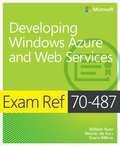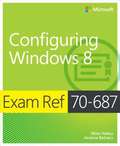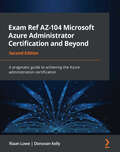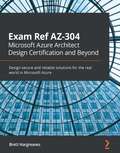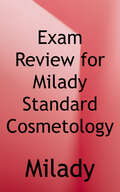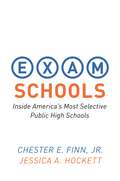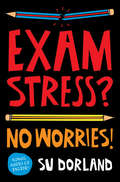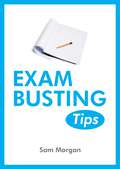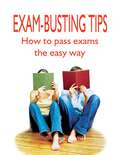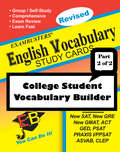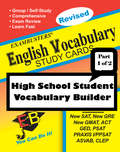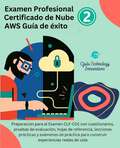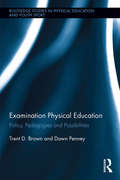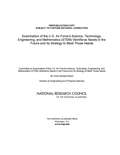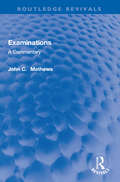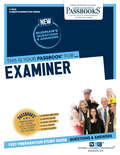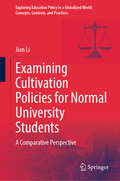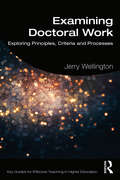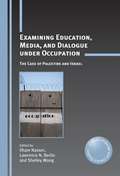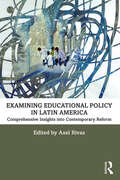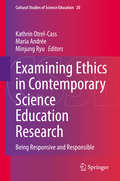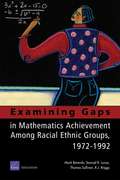- Table View
- List View
Exam Ref 70-487: Developing Windows Azure and Web Services
by William Ryan Wouter De Kort Shane MiltonPrepare for Microsoft Exam 70-487--and help demonstrate your real-world mastery of developing Windows Azure and web services. Designed for experienced developers ready to advance their status, Exam Ref focuses on the critical-thinking and decision-making acumen needed for success at the Microsoft Specialist level. Focus on the expertise measured by these objectives: Accessing data Querying and manipulating data by using the Entity Framework Designing and implementing WCF Services Creating and consuming Web API-based services Deploying web applications and services This Microsoft Exam Ref: Organizes its coverage by exam objectives. Features strategic, what-if scenarios to challenge you. Includes a 15% exam discount from Microsoft. (Limited time offer)
Exam Ref 70-687: Configuring Windows® 8
by Mike Halsey Andrew BettanyPrepare for Exam 70-687--and help demonstrate your real-world mastery of Windows 8 setup and support. Designed for experienced IT Professionals ready to advance their status--Exam Ref focuses on the critical-thinking and decision-making acumen needed for success at the MCSA level. Focus on the expertise measured by these objectives:Install and upgrade to Windows 8 Configure hardware and applications Configure network connectivity Configure access to resources Configure remote access and mobility Monitor and maintain Windows clients Configure backup and recovery options
Exam Ref AZ-104 Microsoft Azure Administrator Certification and Beyond: A pragmatic guide to achieving the Azure administration certification, 2nd Edition
by Riaan Lowe Donovan KellyNavigate Microsoft Azure cloud services like storage, security, networking, and compute cloud capabilities with ease and pass the AZ-104 exam while developing skills for daily useKey FeaturesGet to grips with AZ-104 exam topics like infrastructure and applications to help with Azure administrationExperience Azure through practical labs based on real-world administrative tasksLearn practical management tips from experienced professionalsBook DescriptionExam Ref AZ-104 Microsoft Azure Administrator Certification and Beyond covers all the exam objectives and will help you to earn the Microsoft Azure Administrator certification with ease. Whether you're studying to pass the AZ-104 exam or just want hands-on experience in administering Azure, this AZ-104 study guide will help you to achieve your objectives.This book covers the latest Azure features and capabilities around configuring, managing, and securing Azure resources. Adhering to Microsoft's AZ-104 exam syllabus, this guide is divided into five modules. The first module will show you how to manage Azure identities and governance. You'll find out how to configure Azure subscription policies at the Azure subscription level and use Azure policies for resource groups. After that, the book covers techniques related to implementing and managing storage in Azure, enabling you to create and manage Azure Storage, including File and Blob storage. In the second module, you'll learn how to deploy and manage Azure compute resources. The third and fourth modules will teach you about configuring and managing virtual networks and monitoring and backing up Azure resources. Finally, you'll work through mock tests, with answers provided, to prepare for this exam.By the end of this book, you'll have the skills needed to pass the AZ-104 exam and be able to expertly manage Azure.What you will learnManage Azure Active Directory users and groups along with role-based access control (RBAC)Discover how to handle subscriptions and implement governanceImplement and manage storage solutionsModify and deploy Azure Resource Manager templatesCreate and configure containers and Microsoft Azure app servicesImplement, manage, and secure virtual networksFind out how to monitor resources via Azure MonitorImplement backup and recovery solutionsWho this book is forThis book is for cloud administrators, engineers, and architects looking to understand Azure better and gain a firm grasp on administrative functions or anyone preparing to take the Microsoft Azure Administrator (AZ-104) exam. A basic understanding of the Azure platform is needed, but astute readers can comfortably learn all the concepts without having worked on the platform before by following all examples in the book.
Exam Ref AZ-304 Microsoft Azure Architect Design Certification and Beyond: Design secure and reliable solutions for the real world in Microsoft Azure
by Brett HargreavesMaster the Microsoft Azure platform and prepare for the AZ-304 certification exam by learning the key concepts needed to identify key stakeholder requirements and translate these into robust solutionsKey FeaturesBuild secure and scalable solutions on the Microsoft Azure platformLearn how to design solutions that are compliant with customer requirementsWork with real-world scenarios to become a successful Azure architect, and prepare for the AZ-304 examBook DescriptionThe AZ-304 exam tests an architect's ability to design scalable, reliable, and secure solutions in Azure based on customer requirements. Exam Ref AZ-304 Microsoft Azure Architect Design Certification and Beyond offers complete, up-to-date coverage of the AZ-304 exam content to help you prepare for it confidently, pass the exam first time, and get ready for real-world challenges. This book will help you to investigate the need for good architectural practices and discover how they address common concerns for cloud-based solutions. You will work through the CloudStack, from identity and access through to infrastructure (IaaS), data, applications, and serverless (PaaS). As you make progress, you will delve into operations including monitoring, resilience, scalability, and disaster recovery. Finally, you'll gain a clear understanding of how these operations fit into the real world with the help of full scenario-based examples throughout the book. By the end of this Azure book, you'll have covered everything you need to pass the AZ-304 certification exam and have a handy desktop reference guide.What you will learnUnderstand the role of architecture in the cloudEnsure security through identity, authorization, and governanceFind out how to use infrastructure components such as compute, containerization, networking, and storage accountsDesign scalable applications and databases using web apps, functions, messaging, SQL, and Cosmos DBMaintain operational health through monitoring, alerting, and backupsDiscover how to create repeatable and reliable automated deploymentsUnderstand customer requirements and respond to their changing needsWho this book is forThis book is for Azure Solution Architects who advise stakeholders and help translate business requirements into secure, scalable, and reliable solutions. Junior architects looking to advance their skills in the Cloud will also benefit from this book. Experience with the Azure platform is expected, and a general understanding of development patterns will be advantageous.
Exam Review for Milady Standard Cosmetology
by MiladyThis is one of the primary student supplements to Milady Standard Cosmetology 2016. <p><p>The Exam Review contains chapter-by-chapter questions in multiple-choice formats to help students prepare for their state board exams. The answer key at the back of the book allows students to check accuracy and identify weak areas.
Exam Schools: Inside America's Most Selective Public High Schools
by Chester E. Finn Jessica A. HockettAn in-depth look at academically selective public high schools in AmericaWhat is the best education for exceptionally able and high-achieving youngsters? Can the United States strengthen its future intellectual leadership, economic vitality, and scientific prowess without sacrificing equal opportunity? There are no easy answers but, as Chester Finn and Jessica Hockett show, for more than 100,000 students each year, the solution is to enroll in an academically selective public high school. Exam Schools is the first-ever close-up look at this small, sometimes controversial, yet crucial segment of American public education. This groundbreaking book discusses how these schools work--and their critical role in nurturing the country's brightest students.The 165 schools identified by Finn and Hockett are located in thirty states, plus the District of Columbia. While some are world renowned, such as Boston Latin and Bronx Science, others are known only in their own communities. The authors survey the schools on issues ranging from admissions and student diversity to teacher selection. They probe sources of political support, curriculum, instructional styles, educational effectiveness, and institutional autonomy. Some of their findings are surprising: Los Angeles, for example, has no "exam schools" while New York City has dozens. Asian-American students are overrepresented—but so are African-American pupils. Culminating with in-depth profiles of eleven exam schools and thoughtful reflection on policy implications, Finn and Hockett ultimately consider whether the country would be better off with more such schools.At a time of keen attention to the faltering education system, Exam Schools sheds positive light on a group of schools that could well provide a transformative roadmap for many of America's children.
Exam Stress
by Su DorlandThe first test-prep guide to conquering the toughest exam challenge of all--stress! Each year millions of high school and college students sit down to the make-or-break SAT or final exams. And while the content of a course may not be impossible to master, for many, the stress surrounding an exam often is. In Exam Stress? No Worries! trained psychologist Su Dorland gives frazzled students insights into the causes of exam anxiety, why some people get anxious about exams and why others don't, steps for coping with the two Ps (perfectionism and procrastination), and ways to finally free oneself from exam stress.* Includes a free CD with centering exercises, visualization techniques, and relaxation tracks * Offers advice for students mixing work or other commitments with study, as well as off-campus students, mature students, international students, or students from migrant worker familiesAn important guide not simply for test-takers but anyone facing a stressful situation such as a job interview, a driving test, or a public speaking engagement Exam Stress? No Worries! offers the key to making stress manageable.
Exam-Busting Tips
by Sam MorganWhat's stopping you acing your exams? This handy little book identifies the most common stumbling blocks and is crammed with practical tips on how to overcome academic angst. This is your one-stop expert guide to coordinating your revision and your lifestyle during any exam period, no matter what level of education you are at.
Exam-Busting Tips
by Sam MorganWhat's stopping you acing your exams? This handy little book identifies the most common stumbling blocks and is crammed with practical tips on how to overcome academic angst. This is your one-stop expert guide to coordinating your revision and your lifestyle during any exam period, no matter what level of education you are at.
Exam-Busting Tips: How to Pass Exams the Easy Way
by Summersdale PublishersWhat’s stopping you acing your exams? This handy little book identifies the most common stumbling blocks and is crammed with practical tips on how to overcome academic angst. This is your one-stop expert guide to coordinating your revision and your lifestyle during any exam period, no matter the level of challenge you face.
Exam-Busting Tips: How to Pass Exams the Easy Way
by Summersdale PublishersWhat’s stopping you acing your exams? This handy little book identifies the most common stumbling blocks and is crammed with practical tips on how to overcome academic angst. This is your one-stop expert guide to coordinating your revision and your lifestyle during any exam period, no matter the level of challenge you face.
Exambusters English Vocabulary Study Cards: College (Exambusters Vocabulary #2)
by Ace AcademicsEXAMBUSTERS College Student English Vocabulary Builder Parts 1 and 2 eBook flash cards: Over 350 words every well-educated person should know. While you may not hear them every day, they can show up on standardized exams, and understanding them will boost your score. Includes sample sentence, part of speech, pronunciation, succinct, easy-to-remember definition, and common synonyms and antonyms. Compiled by certified teachers and college professors with a focus on exam preparation. Highlights the essentials to test well. Prepare for quizzes, tests, New SAT, PRAXIS I, GED, GRE, PSAT, GMAT, ACT . . . . A COURSE in an eBook! ======================================== Ace Academics "Exambusters Study Cards" for test prep are tailored to fourteen different standardized tests (for example: SAT, GED, GRE, MCAT, PRAXIS) The flash card format is available in printed cards, CD-Rom software and eBooks.
Exambusters English Vocabulary Study Cards: High School (Exambusters Vocabulary #1)
by Ace AcademicsEXAMBUSTERS High School Student English Vocabulary Builder eBook flash cards: Over 350 frequently tested words every college-bound student should know. Perfect for anyone who wants to enrich their vocabulary! Improve your reading comprehension and conversation. Includes sample sentence, part of speech, pronunciation, succinct, easy-to-remember definition, and common synonyms and antonyms. Compiled by certified teachers and college professors with a focus on exam preparation. Prepare for quizzes, tests, New SAT, PRAXIS I, GED, GRE, PSAT, GMAT, ACT . . . . A COURSE in an eBook! <P><P>Ace Academics "Exambusters Study Cards" for test prep are tailored to fourteen different standardized tests (for example: SAT, GED, GRE, MCAT, PRAXIS) The flash card format is available in printed cards, CD-Rom software and eBooks. <P><P><i>Advisory: Bookshare has learned that this book offers only partial accessibility. We have kept it in the collection because it is useful for some of our members. Benetech is actively working on projects to improve accessibility issues such as these in the future.</i>
Examen Profesional Certificado de Nube AWS Guía de Éxito 2: Preparación para el Examen CLF-C01 con cuestionarios, pruebas de evaluación (Examen Profesional Certificado de Nube AWS Guía de Éxito #2)
by Ojula Technology InnovationsEste libro es el volumen 2 de AWS Certified Cloud Practitioner Exam Success Guide. En este volumen, tú continuarás tus lecciones de los Servicios Web de Amazon. Yo te ayudaré a completar tu preparación y éxito rápido para el examen de Profesional Certificado de Nube de AWS. La gran cosa acerca del examen de profesional de nube es que es muy conveniente para personas provenientes de muy diferentes orígenes. Por lo que no importa si tú tienes o no tienes experiencia técnica, o si tú tienes antecedentes técnicos y tú estás buscando la transición del conjunto de tus habilidades a la nube. Cualquier antecedente del que provengas, esta es la guía apropiada para ti. Todo lo que necesitas está aquí para asegurar que tú pasas tu examen. No estás solo en esto porque yo voy a ayudarte a través de ello. Mi liga de soporte está en este libro para que me contactes en lo que tu necesites ayuda en lo futuro. Cualquiera que sea tu estilo preferido de aprendizaje, yo también te tengo cubierto. Si tú eres un estudiante visual, tu amarás mis diagramas e ilustraciones claros a través de este libro. Tú disfrutarás los hechos que yo te presento y las hojas de referencia que he creado porque tienen información específica del examen. Si tú eres un estudiante práctico, tú amarás las lecciones prácticas de manera que puedas obtener práctica con AWS y aprender de una forma práctica. Acerca de las lecciones prácticas, hay dos diferentes tipos de lecciones prácticas en esta guía. El primero es una demo. Una demo es una demostración pura en la cual te muestro algo, pero tú no necesitas seguirlo solo. La razón por la que hago eso, es poque hay pocos ejemplos en los cuales yo quiero mostrarte algo visualmente, por lo que yo puedo demostrarte algunas características de AWS. Pero establecerlo podría ser un poco más complejo que lo que el examen de profesional de nube requiere. Aunque son algunos de esos, ellos son una forma útil de
Examination Physical Education: Policy, Practice and Possibilities (Routledge Studies in Physical Education and Youth Sport)
by Dawn Penney Trent D. BrownIn recent decades physical education has moved from the margins, redefining itself as an academic subject. An important component of this transformation has been the introduction of high-stakes examinations at key points in a student’s school career and the emergence of ‘examination physical education’ as the dominant paradigm in many educational systems around the world. This book is the first to explore the growing international literature on examination physical education and draw on research to extend the political, academic and professional debates around the subject to explore its limitations and possibilities. Addressing key topics such as curriculum development, assessment methods, and teacher education, it seeks to assess how our existing knowledge of examination physical education can be best translated into pedagogical practice in the classroom. Complementing other texts in the Routledge Studies in Physical Education and Youth Sport Series, it makes an original and informed contribution to current discussions of physical education. Examination Physical Education: Policy, Practice and Possibilities is important reading for any student, researcher or teacher educator with an interest in physical education, sports pedagogy and education policy.
Examination of the U.S. Air Force's Science, Technology, Engineering, and Mathematics (STEM) Workforce Needs in the Future and its Strategy to Meet Those Needs
by National Research Council of the National AcademiesThe Air Force requires technical skills and expertise across the entire range of activities and processes associated with the development, fielding, and employment of air, space, and cyber operational capabilities. The growing complexity of both traditional and emerging missions is placing new demands on education, training, career development, system acquisition, platform sustainment, and development of operational systems. While in the past the Air Force's technologically intensive mission has been highly attractive to individuals educated in science, technology, engineering, and mathematics (STEM) disciplines, force reductions, ongoing military operations, and budget pressures are creating new challenges for attracting and managing personnel with the needed technical skills. Assessments of recent development and acquisition process failures have identified a loss of technical competence within the Air Force (that is, in house or organic competence, as opposed to contractor support) as an underlying problem. These challenges come at a time of increased competition for technical graduates who are U.S. citizens, an aging industry and government workforce, and consolidations of the industrial base that supports military systems. In response to a request from the Deputy Assistant Secretary of the Air Force for Science, Technology, and Engineering, the National Research Council conducted five fact-finding meetings at which senior Air Force commanders in the science and engineering, acquisition, test, operations, and logistics domains provided assessments of the adequacy of the current workforce in terms of quality and quantity.
Examinations: A Commentary (Routledge Revivals)
by John C. MathewsFirst Published in 1985, Examinations presents a balanced overview and commentary on all the main aspects of public examinations. The key themes are examinations and their context (historical, political, social, and educational); functions of examination (how they work); equity and fairness of the process; and future of public examinations. Recurring issues in the book are the tension between the need for common national standards and the need for diverse individuality and the conflict between competitive functions of examinations as instruments of selection and their descriptive function as reports on standards of performance. The author argues that the main aspects of examinations are not given a prominent place in the training of teachers though public examinations have widespread impact on society. This book will be an essential read for scholars and researchers of education, higher education and also for administrators and policy makers.
Examiner: Passbooks Study Guide (Career Examination Series #C-140)
by National Learning CorporationThe Examiner Passbook® prepares you for your test by allowing you to take practice exams in the subjects you need to study. It provides hundreds of questions and answers in the areas that will likely be covered on your upcoming exam.
Examining Cultivation Policies for Normal University Students: A Comparative Perspective (Exploring Education Policy in a Globalized World: Concepts, Contexts, and Practices)
by Jian LiThis book systematically explores cultivation policies for normal university students from a comparative perspective. A normal school or normal university is an institution created to train teachers by educating them in the norms of pedagogy and curriculum. The book investigates the cultivation policies for normal university students of nine countries, including Russia, Canada, Germany, South Korea, Japan, France, Australia, the USA, and the UK. It provides an in-depth understanding of a global landscape of normal university student cultivation policy development. In addition, this book also offers specific suggestions and strategies to address various challenges and problems faced by policymakers. This book serves as a useful reference for scholars and researchers who are interested or working in the normal university student education policy field, as well as administrators and stakeholders involved in teacher education system construction, and graduate students who major or minor in the subject of teacher education.
Examining Doctoral Work: Exploring Principles, Criteria and Processes (Key Guides for Effective Teaching in Higher Education)
by Jerry WellingtonWritten in clear, straight-forward language, Examining Doctoral Work considers how the practice of doctoral examination can be improved to ensure that both examiners and students can make the most of the assessment process. This book analyses both good and bad practice to promote fair, thorough and productive examination. With insight into how to prepare for a viva, as well as a consideration of the responsibilities afterwards, the book de-mystifies this crucial part of the doctoral examination process to provide a comprehensive overview of the principles, criteria and processes needed to ensure success. Key points covered include: The different forms doctoral submission can take How examiners are chosen Where to begin when reading a thesis Managing your time as an examiner What makes a ‘good’ doctoral thesis? How to prepare for the viva How to develop a preliminary report The role of the supervisor before, during and after the viva Examiners’ roles and responsibilities Working through agreements and disagreements Feeding back both orally and in writing. Drawing from a mixture of personal experience, existing research and anecdote, this book is ideal reading for anyone new to the world of doctoral examination, or equally those looking to improve their practice.
Examining Education, Media, and Dialogue under Occupation
by Ilham Nasser Lawrence N. BerlinThis book is an in-depth examination of education and media under occupation. The contributors to this volume engage dialogue to explore these domains and their roles and functioning under occupation while keeping an eye toward resolution, using the on-going conflict between Palestine and Israel as the focus. The uniqueness of this collection is not limited to the willingness of its authors to investigate topics that have often been left out of the mainstream, but that they actually enter into dialogue with one another. Education and media are exemplified as domains that can either maintain the status quo of oppression when used by policymakers and governments to do so or can be utilized as mechanisms for change and peacemaking. These contradictory roles are highlighted throughout this book by multiple voices.
Examining Educational Policy in Latin America: Comprehensive Insights into Contemporary Reform
by Axel RivasThis book synthesizes and analyzes the complex map of educational reforms in Latin America in the first two decades of the 21st century. The book offers insights into the agendas, processes and political economy of educational reforms in Argentina, Brazil, Chile, Colombia, Mexico and Peru. Written by renowned contributors from each country, chapters present systematic, critical and reflective accounts of an intense period of education reforms. The book fills a gap in educational research and provides a systematic study that compares the cases analyzed. The first broad, comparative collection of its kind, the book is well-suited to courses in international and comparative education policy.
Examining Effective Practices at Minority-Serving Institutions: Beyond a Deficit Framing of Leadership
by Robert T. Palmer DeShawn Preston Amanda AssaloneThis book aims to help expand the pipeline for executive leaders at Minority-Serving Institutions (MSIs), where there is a high turnover in leadership, particularly among HBCUs. The editors and their contributors examine leadership at MSIs from an anti-deficit approach and create and add to the scholarly discourse around effective leadership practices, models, and strategies for leaders at MSIs. With this approach, this book seeks to help leaders of MSIs increase their leadership capacities, which may help expand the pipeline of MSI leaders and equip them with the skills to be successful in their positions.
Examining Ethics in Contemporary Science Education Research: Being Responsive and Responsible (Cultural Studies of Science Education #20)
by Kathrin Otrel-Cass Maria Andrée Minjung RyuThis book poses questions on how to work ethically in research on science education. Applying research ethics reflectively and responsibly is fundamental for conducting research with people. It seeks to renew the conversation on how and why to engage with ethics in science education research and to adjust and refine research practices. It highlights both the need for methodological reflections in science education research and the particular ethical research challenges of science education. Science education research involves the study of people – often young and vulnerable people – and their practices. Researchers working within humanities and social science research commonly follow guidelines and codes of conducts set by country-specific ethics committees. Such guidelines function as minimal requirement for ethical reflection. This book seeks to engage the community of science education researchers in a conversation on ethics in science education moving beyond the mere compliance with governmental regulations toward a collective reflection. It asks the question of whether the existing guidelines provided for researchers are keeping up with contemporary realities of the visual presence of individuals in digital spaces. It also asks questions on how participatory research methodologies alters the relations between researchers and practitioners. This book is organized into two parts: Part one is entitled Challenging existing norms and practices. It asks questions such as: What are the conditions of knowledge that shape ethical decision making? Where is this kind of knowledge coming from? How is this knowledge structured, and where are the limitations? How can we justify our beliefs concerning our ethical research actions? Part two Epistemological considerations for ethical science education research centres norms and practices of conducting science education research in regard to methods, validity and scope.
Examining Gaps in Mathematics Achievement Among Racial-Ethnic Groups, 1972-1992
by Mark Berends R. J. Briggs Samuel R. Lucas Thomas SullivanExamines trends in the mathematics scores of different racial-ethnic groups over time and analyzes how changes in family, school, and schooling measures help explain changes in the test score gaps. Although there were few positive changes between schools, the within-school experiences of black and Latino students changed for the better compared with white students when measured by student self-reported academic track placement.
